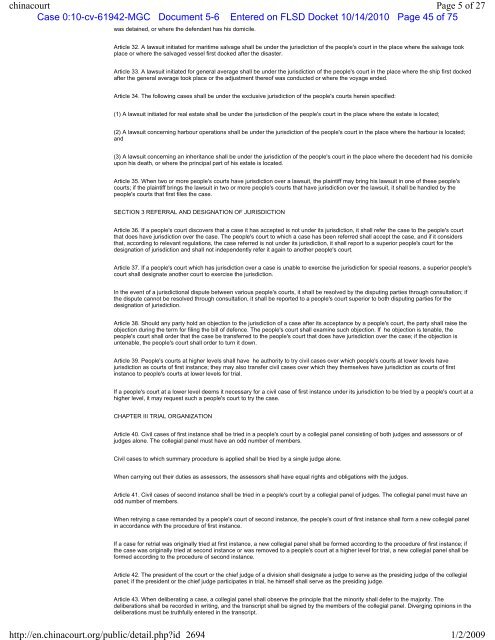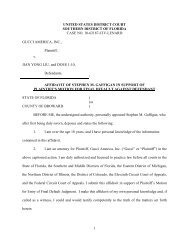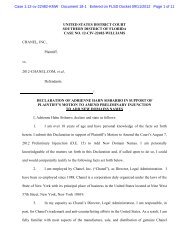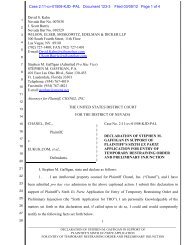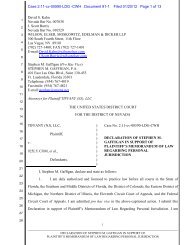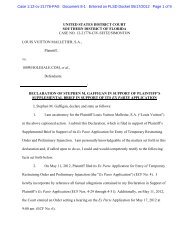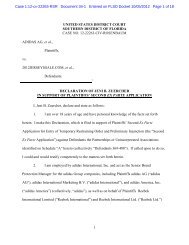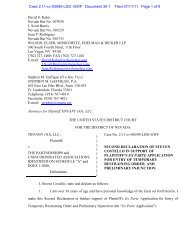UNITED STATES DISTRICT COURT SOUTHERN DISTRICT OF ...
UNITED STATES DISTRICT COURT SOUTHERN DISTRICT OF ...
UNITED STATES DISTRICT COURT SOUTHERN DISTRICT OF ...
Create successful ePaper yourself
Turn your PDF publications into a flip-book with our unique Google optimized e-Paper software.
Case 0:10-cv-61942-MGC Document 5-6 Entered on FLSD Docket 10/14/2010 Page 45 of 75<br />
was detained, or where the defendant has his domicile.<br />
Article 32. A lawsuit initiated for maritime salvage shall be under the jurisdiction of the people's court in the place where the salvage took<br />
place or where the salvaged vessel first docked after the disaster.<br />
Article 33. A lawsuit initiated for general average shall be under the jurisdiction of the people's court in the place where the ship first docked<br />
after the general average took place or the adjustment thereof was conducted or where the voyage ended.<br />
Article 34. The following cases shall be under the exclusive jurisdiction of the people's courts herein specified:<br />
(1) A lawsuit initiated for real estate shall be under the jurisdiction of the people's court in the place where the estate is located;<br />
(2) A lawsuit concerning harbour operations shall be under the jurisdiction of the people's court in the place where the harbour is located;<br />
and<br />
(3) A lawsuit concerning an inheritance shall be under the jurisdiction of the people's court in the place where the decedent had his domicile<br />
upon his death, or where the principal part of his estate is located.<br />
Article 35. When two or more people's courts have jurisdiction over a lawsuit, the plaintiff may bring his lawsuit in one of these people's<br />
courts; if the plaintiff brings the lawsuit in two or more people's courts that have jurisdiction over the lawsuit, it shall be handled by the<br />
people's courts that first files the case.<br />
SECTION 3 REFERRAL AND DESIGNATION <strong>OF</strong> JURISDICTION<br />
Article 36. If a people's court discovers that a case it has accepted is not under its jurisdiction, it shall refer the case to the people's court<br />
that does have jurisdiction over the case. The people's court to which a case has been referred shall accept the case, and if it considers<br />
that, according to relevant regulations, the case referred is not under its jurisdiction, it shall report to a superior people's court for the<br />
designation of jurisdiction and shall not independently refer it again to another people's court.<br />
Article 37. If a people's court which has jurisdiction over a case is unable to exercise the jurisdiction for special reasons, a superior people's<br />
court shall designate another court to exercise the jurisdiction.<br />
In the event of a jurisdictional dispute between various people's courts, it shall be resolved by the disputing parties through consultation; if<br />
the dispute cannot be resolved through consultation, it shall be reported to a people's court superior to both disputing parties for the<br />
designation of jurisdiction.<br />
Article 38. Should any party hold an objection to the jurisdiction of a case after its acceptance by a people's court, the party shall raise the<br />
objection during the term for filing the bill of defence. The people's court shall examine such objection. If he objection is tenable, the<br />
people's court shall order that the case be transferred to the people's court that does have jurisdiction over the case; if the objection is<br />
untenable, the people's court shall order to turn it down.<br />
Article 39. People's courts at higher levels shall have he authority to try civil cases over which people's courts at lower levels have<br />
jurisdiction as courts of first instance; they may also transfer civil cases over which they themselves have jurisdiction as courts of first<br />
instance to people's courts at lower levels for trial.<br />
If a people's court at a lower level deems it necessary for a civil case of first instance under its jurisdiction to be tried by a people's court at a<br />
higher level, it may request such a people's court to try the case.<br />
CHAPTER III TRIAL ORGANIZATION<br />
<br />
Article 40. Civil cases of first instance shall be tried in a people's court by a collegial panel consisting of both judges and assessors or of<br />
judges alone. The collegial panel must have an odd number of members.<br />
Civil cases to which summary procedure is applied shall be tried by a single judge alone.<br />
When carrying out their duties as assessors, the assessors shall have equal rights and obligations with the judges.<br />
Article 41. Civil cases of second instance shall be tried in a people's court by a collegial panel of judges. The collegial panel must have an<br />
odd number of members.<br />
When retrying a case remanded by a people's court of second instance, the people's court of first instance shall form a new collegial panel<br />
in accordance with the procedure of first instance.<br />
If a case for retrial was originally tried at first instance, a new collegial panel shall be formed according to the procedure of first instance; if<br />
the case was originally tried at second instance or was removed to a people's court at a higher level for trial, a new collegial panel shall be<br />
formed according to the procedure of second instance.<br />
Article 42. The president of the court or the chief judge of a division shall designate a judge to serve as the presiding judge of the collegial<br />
panel; if the president or the chief judge participates in trial, he himself shall serve as the presiding judge.<br />
Article 43. When deliberating a case, a collegial panel shall observe the principle that the minority shall defer to the majority. The<br />
deliberations shall be recorded in writing, and the transcript shall be signed by the members of the collegial panel. Diverging opinions in the<br />
deliberations must be truthfully entered in the transcript.


